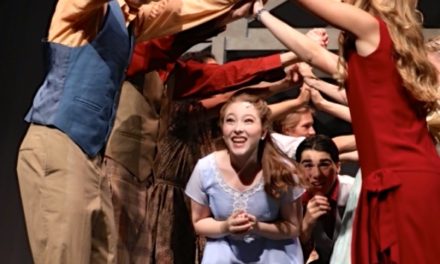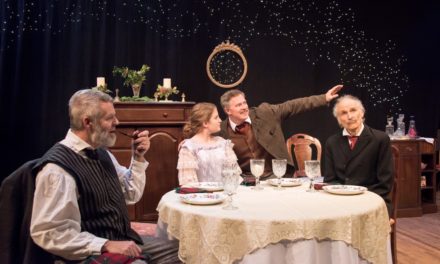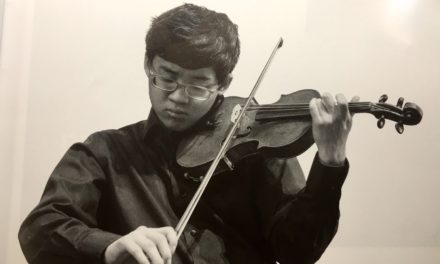By Kelly Oristano
“Phone rings, door chimes, in comes company.” — Stephen Sondheim.
What would you do if you found a briefcase with 735,000 British pounds in it? If you’re a character in Funny Money, the latest staging from The Not Ready For Retirement Players, now playing and slaying at the Hult Center for the Performing Arts, you might ask, “Pounds of what?”
If you’re Henry Perkins (Scott Machado) you take that briefcase home to 42 Elgar Road and Mrs. Jean Perkins, (Melanie Moser), and then you brace yourself for 90 minutes of riotous, manic — but well-engineered — farce that ropes in cops, neighbors, friends, fake Australians, real cabbies, fake sex workers, accidental wife swaps, and eventually the unknown “Mr. Big” who dropped the McGuffin (defined as an object or device in a movie or a book that serves merely as a trigger for the plot) in Henry’s lap in the first place.
The frenetic action centers on and orbits around Henry and Jean in their modest London flat, which is a beautiful static set designed by Michael Walker. The Perkinses realize together early on that the briefcase’s original owner is probably not a very nice guy and could come looking for Henry presently; the pair smartly plan to hop in a cab to the airport and wait it out in Barcelona with only the clothes on their backs and their new fortune in Samsonite. But, this being farce, that’s when the doorbell starts ringing. And it never stops.
Some visitors are expected, but when the bell rings it’s never who you think. It’s Henry’s birthday today don’t you know, so their friends Vic and Betty Johnson will be over for a celebratory dinner. Paul Rhoden’s Vic is very funny and daft in equal parts while Janna Slack’s Betty is comically ahead of the game from the jump. Vic can’t keep up with constant changes of names and stories that confuse and distract other visitors, while Betty loves to shore them up with exciting details of her own. “Even with a satellite dish you can’t get stuff this good,” she says enthusiastically when things get especially juicy. Over the course of an evening — and often under a well-used blanket — Vic and Betty become willing, semi-competent accomplices in the subterfuge.
Oh, and recall that when Henry and Jean were planning their First Class Barcelona Getaway they called a cab. So, this being London, of course Bill the Cabbie (Chris Pinto) comes right up to the front door. And sure enough, since his passengers aren’t ready to depart, why wouldn’t he come in and sit down in their parlor, answer their phone, and pick up just enough clues to slyly tweak the last few plot twists.
Even in today’s fast-paced cosmopolis of London you don’t lose or find a cool three-quarters of a million quid without a copper or two taking an interest. Detectives Davenport and Slater (Dan Pegoda and William Campbell) both have a comedy crime fighter’s preternatural instincts to exit a room just long enough and return at exactly the right moment to catch those who remain there in the silliest, least explainable situations possible. And as cops, they have only to stand there and wait for a ridiculous explanation to be forthcoming. It is from these risible explanations that Henry, Jean, Vic and Betty become by turns fake Australians, fake sex workers, each other’s imaginary in-laws, and a few other noms de guerre that get lost in the comic interplay.
Ray Cooney’s script has a wide range of comedy: rather dry Britishisms; a lot of broad funny wordplay; and a good deal of adroit physical comedy. Pinto’s direction keeps the story even-keeled, never dragging and rushing by turns at effectively chosen moments.
Sometimes farce can throw a bunch of jokes in a pile and hope that stacking them high enough makes them work. Here, the story requires a more seasoned hand as it moves rapidly from real exposition to real comedy to real character and plot development and back to high farce. And that’s just Act One.
The reality of the characters and the high stakes moment they find themselves in makes Act Two doubly effective. While it continues to be comic, its twists and turns also produce a sort of funny anxiety as we start to guess which threads are going to wrap up which way and as the characters we rooted for and against get what’s coming to them, whether we like it or not.
The cast is strong from the bottom up. The tw0 actors named Chris — McVay and Pinto — have the smallest roles, but each gets big laughs and makes vital plot turns happen on stage. Pinto’s stymied reactions to everything he sees and hears are a funny stand-in for how the audience is feeling; McVay is larger than life as the imposing figure who comes looking for his briefcase as Act Two draws to a close.
Pegoda and Campbell approach perfection as the each-partially-aware pair of detective sergeants who somehow never quite figure out that they could work together and probably sort this thing out. Pegoda’s unassuming Davenport makes out rather like a bandit, using perhaps his ears more than his mouth, while Campbell’s Slater, full of bombast and certitude, takes more lumps than the average character in this show.
Janna Slack and Paul Rhoden are wonderfully complementary characters, very funny together and with the Perkinses. Slack’s Betty displays a big personality in Act One that only hints at how big her personality will get in Act Two. Vic is always game, but always one key step behind. We could see the toll the evening took on Vic in Rhoden’s increasingly haunted stares of miscomprehension. He seemed to grow paler and paler as the plot became gauzier and gauzier to him. It would be fun to see a companion play, perhaps less madcap, about these particular Johnsons and their lives when the Perkinses aren’t stealing all the attention.
Melanie Moser is classic as the having-exactly-none-of-your-nonsense British hausfrau. She has a powerful voice and an effortless comic deadpan which combine to save Jean from being a second banana to Henry, positioning her instead as an equal player in the madness at 42 Elgar.
Scott Machado’s Henry Perkins is a very strong comic turn, and equally well-acted. Machado has displayed a great deal of versatility on the Eugene stage, but I don’t think his characters ever fail to be endearing. He brings to Henry shades of Basil Fawlty when he’s at the mercy of the elements, and shades of MGM-era Groucho Marx when he thinks he’s in control.
Farce works best when the audience gives a damn about the characters and situations. Funny Money’s ensemble should be highly praised for creating eight characters we can root for and against, and care about enough to forgive the ridiculousness of the situations in which they find themselves. It’s a hard alchemy to master, and you’ve only a very short run to catch the mastery. It’s also a more than pleasing escape, a needed thing nowadays, and it has the air of a labor of love for all involved.
Having opened with one of St. Stephen’s more optimistic lines, please indulge closing with one of his truest and darkest: “There’s no place like London.”
Funny Money
When: 7:30 p.m. on Aug. 17-18 and 24-25; matinees at 2 p.m. on Aug. 19 and 26
Where: The Studio on the lower level of the Hult Center for the Performing Arts, One Eugene Center (at Seventh and Willamette streets in downtown Eugene)
Tickets: $20-23 general admission, available at the Hult Center box office, 541-682-5000, or online at hultcenter.org
Information: notreadyforretirementplayers.com








